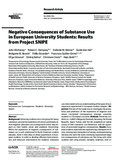Mostrar el registro sencillo del ítem
Negative consequences of substance use in European university students: results from Project SNIPE
| dc.creator | McAlaney, John | es_ES |
| dc.creator | Dempsey, Robert C. | es_ES |
| dc.creator | Helmer, Stefanie M. | es_ES |
| dc.creator | Hal, Guido van | es_ES |
| dc.creator | Bewick, Bridgette M. | es_ES |
| dc.creator | Akvardar, Yildiz | es_ES |
| dc.creator | Guillén Grima, Francisco | es_ES |
| dc.date.accessioned | 2020-08-06T08:35:31Z | |
| dc.date.available | 2020-08-06T08:35:31Z | |
| dc.date.issued | 2020 | |
| dc.identifier.issn | 1022-6877 | |
| dc.identifier.uri | https://hdl.handle.net/2454/37742 | |
| dc.description.abstract | Background: University students are a risk group for heavy substance use and the experience of various potentially severe negative substance use consequences which may impact on their health, social, and academic functioning. Whilst the experience of negative consequences of substance use is well understood in North American student samples, there is little data on these experiences in European students. In order to develop effective harm prevention and reduction interventions for students' substance use, there needs to be an understanding of the types of consequences experienced in European student samples. Objectives: The aim of the study was to investigate the prevalence and predictors of the experience of negative substance use-related consequences amongst university students in 7 European countries. Methods: University students (n = 4,482) in Belgium, Denmark, Germany, the Slovak Republic, Spain, Turkey, and the UK completed an online survey of their substance use behaviours and the experience of associated negative consequences. Results: European students reported that experiencing a hangover or illness, missing class, being short of money, and experiencing memory loss were the most commonly experienced negative consequences of substance use. Not living with other students and using alcohol, cannabis, sedatives, and cocaine were also associated with higher odds of experiencing these negative consequences. Conclusions: In contrast to North American data, European university students tended to experience consequences that are associated with lower level health risks rather than more severe consequences (e.g., drink-driving and physical injury). Harm prevention and reduction interventions for students should be targeted towards those consequences that are most salient to the target group to ensure feedback is relevant and potentially more effective in changing students' substance use behaviours. | en |
| dc.description.sponsorship | The SNIPE project was supported by a grant from the European Commission Directorate of Justice (LS/2009–2010/DPIP/AG). | en |
| dc.format.extent | 8 p. | |
| dc.format.mimetype | application/pdf | en |
| dc.language.iso | eng | en |
| dc.publisher | Karger | en |
| dc.relation.ispartof | European Addiction Research, 2020 | en |
| dc.rights | © 2020 The Author(s). This article is licensed under the Creative Commons AttributionNonCommercial-NoDerivatives 4.0 International License (CC BY-NC-ND) (http://www.karger.com/Services/OpenAccessLicense). Usage and distribution for commercial purposes as well as any distribution of modified material requires written permission. | en |
| dc.rights.uri | http://creativecommons.org/licenses/by-nc-nd/4.0/ | |
| dc.subject | Substance use | en |
| dc.subject | Consequences | en |
| dc.subject | Students | en |
| dc.subject | University | en |
| dc.subject | Health | en |
| dc.title | Negative consequences of substance use in European university students: results from Project SNIPE | en |
| dc.type | info:eu-repo/semantics/article | en |
| dc.type | Artículo / Artikulua | es |
| dc.contributor.department | Ciencias de la Salud | es_ES |
| dc.contributor.department | Osasun Zientziak | eu |
| dc.rights.accessRights | info:eu-repo/semantics/openAccess | en |
| dc.rights.accessRights | Acceso abierto / Sarbide irekia | es |
| dc.identifier.doi | 10.1159/000507438 | |
| dc.relation.publisherversion | https://doi.org/10.1159/000507438 | |
| dc.type.version | info:eu-repo/semantics/publishedVersion | en |
| dc.type.version | Versión publicada / Argitaratu den bertsioa | es |
Ficheros en el ítem
Este ítem aparece en la(s) siguiente(s) colección(ones)
La licencia del ítem se describe como © 2020 The Author(s). This article is licensed under the Creative Commons AttributionNonCommercial-NoDerivatives 4.0 International License (CC BY-NC-ND) (http://www.karger.com/Services/OpenAccessLicense). Usage and distribution for commercial purposes as well as any distribution of modified material requires written permission.



